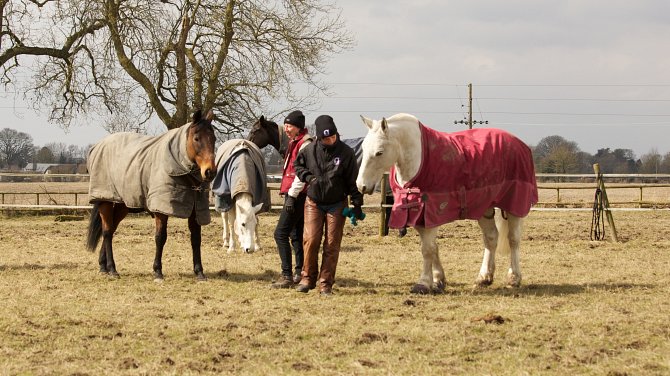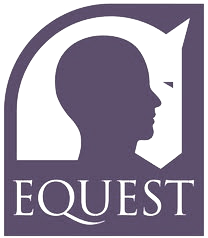|
The first member of the team stepped out into the paddock to meet the horses he and his colleagues would be working with for the next two days. He had bravely volunteered to be the first, in spite of feeling nervous and knowing nothing about horses. I walked with him as he approached the first of the horses who was quietly grazing nearby. The first member of the team stepped out into the paddock to meet the horses he and his colleagues would be working with for the next two days. He had bravely volunteered to be the first, in spite of feeling nervous and knowing nothing about horses. I walked with him as he approached the first of the horses who was quietly grazing nearby. When he was about three feet away from the horse, she turned her head and walked politely but firmly away. I noticed the man take a quick intake of breath. He tried again and the same thing happened. I heard at a distance the restrained chuckling of his fellow Board members who were observing from the fence.
“Shall I try another horse? This one seems too hungry.” The man asked me. “Yes, sure.” I agreed. So he approached a second horse and the same pattern repeated itself. Again, I could hear laughter from the rest of the team but this time they made no effort to disguise it. The man didn’t try a second time with the horse and turned to look at me, shrugging his shoulders in defeat. “They don’t seem to want to say hello to me. Guess I’m not very good at this.” I asked him to describe to me his experience with the horses and what had been happening for him during the interactions he had had with them. He talked about feeling nervous, as he knew so little about this new situation he was facing. “And is there anything else you were nervous of?” I asked and paused as he reflected. “I was nervous about looking stupid I suppose, in front of my peers and in particular the CEO. I knew they’d laugh if I messed it up – which I did…and they did. We don’t take any prisoners in our team.” I invited the man to return to the fence with me to check in with his colleagues. One of them slapped him on the arm good-naturedly and said “Never mind – good try. But you’d better take a few carrots next time old son.” The man then described his experience to his colleagues in a matter of fact way. “Well I tried approaching both horses, but they were far too busy eating to take any notice of me.” Tactfully, I led him to share some more about what had been happening on an emotional level. “Well actually I suppose I was quite nervous – of the horses themselves but also of looking stupid in front of everyone.” “And how did the behaviour of your colleagues help or hinder you in the process?” I followed up. The banter evaporated suddenly and silence fell. A couple of people looked at the ground and shifted their weight from one foot to the other. Eventually he said, “If I’m honest it was unhelpful to hear everyone laughing at me as I failed. Quite humiliating actually…” His voice faded into the now uncomfortable silence which I allowed to continue until the CEO spoke. “I’m sorry. That was really disrespectful of me, of us. When you had the bottle to step up and go first too, it wasn’t fair at all to laugh. The same probably would have happened to me.” We then explored together whether this was a familiar dynamic in the team. We talked about how they behaved with each other (and others) when someone was struggling and how they tended to react when the whole team found themselves in a new situation. What was it about the team and company culture which made it difficult for them to find, or show, empathy and compassion for others when they needed it? This led to a discussion about whether what had been seen as “failing” could be redefined as having the courage to try something new and learn from what happened. And then whether the group could chose to see this courage rather than the fact that he had not succeeded in what he set out to do. After fifteen minutes or so of this engaged and meaningful discussion, I invited the man to try again with the horses and asked him this time to tell the team what they could do to help. “Observing in silence would be good, and encouraging me when I need it. And if it goes wrong again then feedback later and ideas on what to do differently would be welcome.” Holding his head higher this time, the man entered the paddock. He was clearly more relaxed after the discussion we’d all had. He paused when he was six feet or so away from the first horse. He held his hand out to greet her then put it back in his pocket, and I heard him breathe out as he did so. The horse suddenly lifted her head and looked up straight into his eyes. They held each others’ gaze for a moment. “I think she’d be happy to meet you now,” I encouraged. He stepped forward confidently and the horse nuzzled his now outstretched hand. He lifted the other hand and stroked her strong neck. I heard a cry of celebration erupt from the fence line and a huge grin broke out on his face. In this first hour of the two day programme which this Senior Management Team embarked on, most of the unhelpful behaviour patterns which had become embedded in the team culture were flushed out into the open. As each person took turns to engage with the horses they embraced their own vulnerability and were thus able to step into a truly authentic exploration of themselves, their relationship with each other and the real nature of the team culture they had all co-created. The gentle process which ensued helped them to identify the subtle yet corrosive behaviours which they all privately knew were unhealthy for their own performance as well as the wider organisation but hadn’t been able to name previously. At the same time they were able to acknowledge that the team culture had evolved as a result of the pressure and anxiety prevalent in their industry and the accompanying need to appear constantly invincible. As they peeled away the layers of façade and all found a way of being simply themselves, relaxed with each other, unafraid of failing, looking silly or needing to score points, the horses responded more and more positively towards them. The reaction of the herd fed a positive learning cycle with immediate and deeply satisfying feedback. By the end of the programme, the team looked like different people to me. Certainly to the horses. And probably to each other too. They had had the courage to say what needed to be said, and to be the people they needed to be. And to meet their own failings and those of their colleagues with empathy, compassion and support. Can your team find the courage to converse with this depth of honesty? And if not perhaps a horse could help….
0 Comments
Your comment will be posted after it is approved.
Leave a Reply. |
NewsWelcome to our news page. This is where we keep all the interesting stuff as and when it happens. We hope you find it interesting, inspiring and informative.
Categories
All
latest eventsLoading... NEWS Archive
December 2023
|
LOCATION: Suddene Park Farm, Wolfhall Road, Burbage, Marlborough, Wiltshire
Registered address for correspondence only: Equest Limited, 126 High St, Marlborough SN8 1LZ, United Kingdom | Company registration number: 07713922
Registered address for correspondence only: Equest Limited, 126 High St, Marlborough SN8 1LZ, United Kingdom | Company registration number: 07713922
© 2014-2020 Equest Limited. All rights reserved | Photos by Emily Corcoran Photography | PRIVACY AND COOKIES POLICY | Website design by Bright Blue C



 RSS Feed
RSS Feed